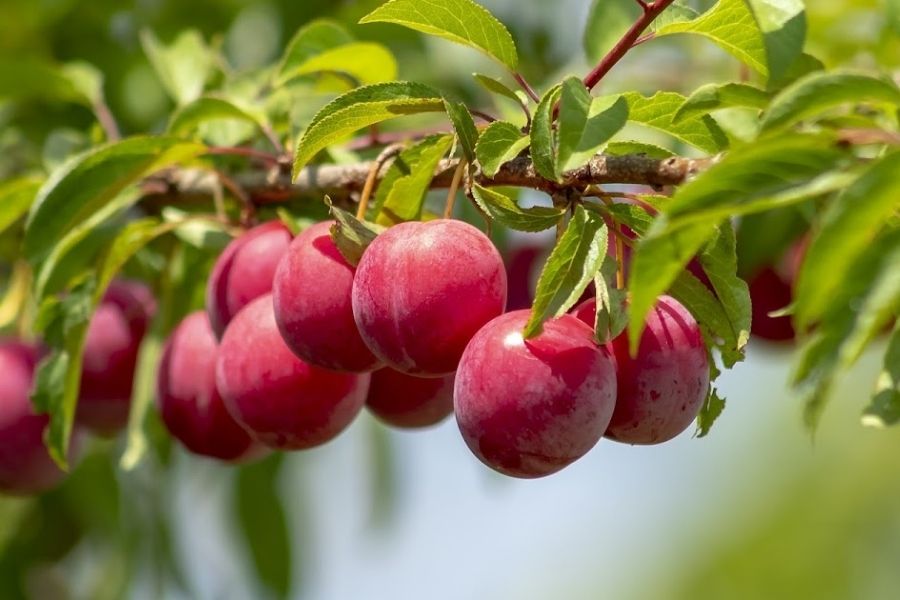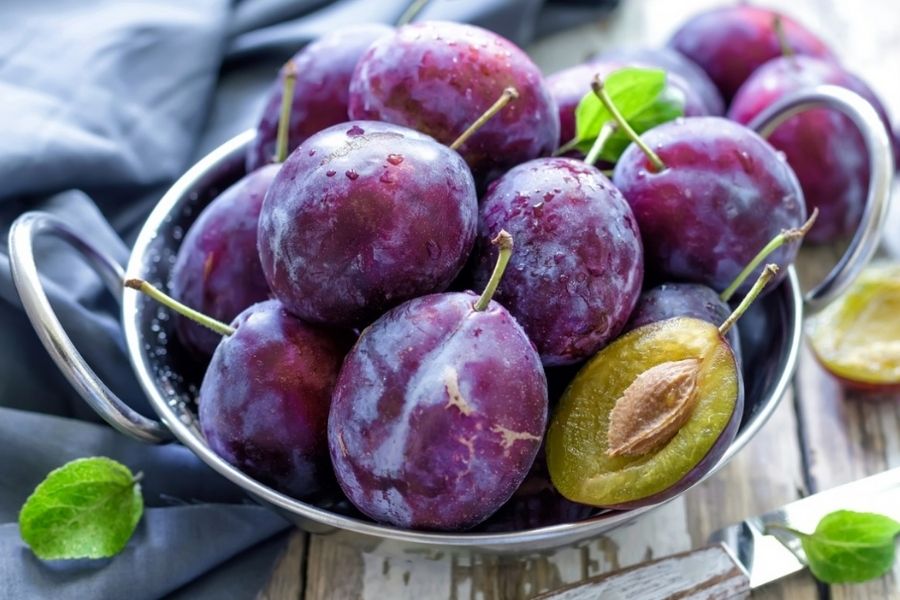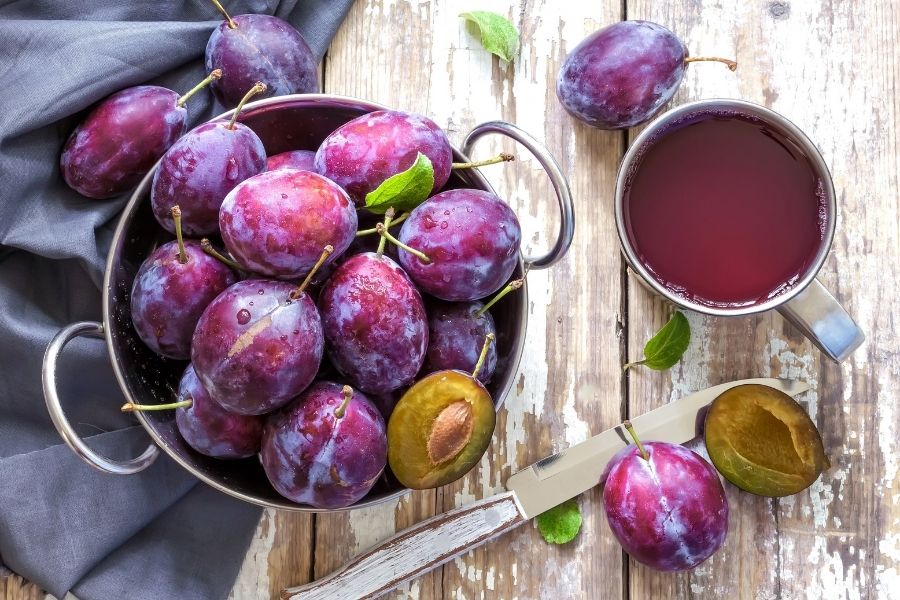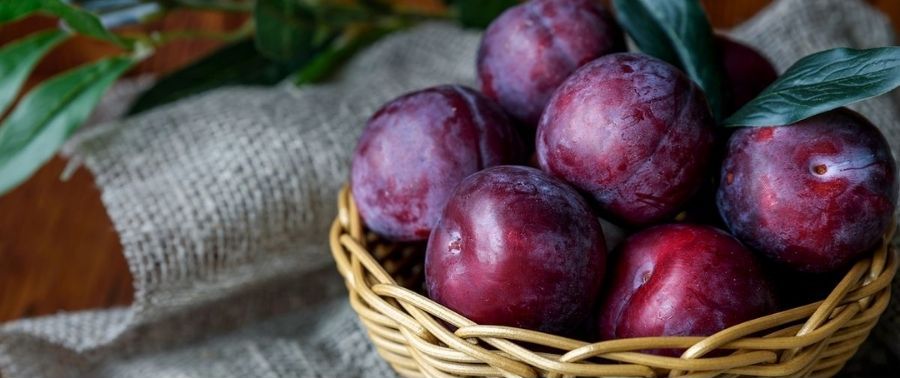OVERVIEW:
Everyone likes to eat fruits, but everyone’s interest in fruits may be different. Some people like apples, some people like the taste of grapes, banana or oranges.
At the same time, there are some people who are more attracted to sour-sweet fruits. Plums are included in these fruits.
Not only taste, but many medicinal properties are also hidden in this fruit. In this article, you will know about the proven health benefits of plums, its nutritional value and side-effects.
WHAT ARE PLUMS?
Plums are sour-sweet in taste. It belongs to the rose family (Rosaceae). The plumage looks like a tomato and is purple or red in color.
Usually, plums are available in the market from May to October. Some of its common varieties include red plums, yellow plums, black plums, greengage plums and pluots.
Plums can be eaten fresh or dried. There are more than 2000 varieties of plums found all over the world. Along with the United States, Russia and Romania, China is one of the biggest produces of plums around the world.
It is rich in vitamin A, vitamin C, vitamin K and fiber. Along with this, it also contains many healthy antioxidants. Its consumption helps reduce high blood pressure (hypertension), risk of stroke and increases the amount of iron in the body.
PLUM NUTRITION FACTS:
According to Nutrition Data, per 100 gram serving of fresh raw plums contains:
- Calories: 46
- Total Carbohydrate: 11.4 g
- Dietary Fiber: 1.4 g
- Protein: 0.7 g
- Vitamin A: 345 IU
- Vitamin C: 9.5 mg
- Vitamin E (Alpha Tocopherol): 0.3 mg
- Vitamin K: 6.4 mcg
- Calcium: 6 mg
- Iron: 0.2 mg
- Magnesium: 7 mg
- Phosphorus: 16 mg
- Potassium: 157 mg
- Zinc: 0.1 mg
- Copper: 0.1 mg
- Manganese: 0.1 mg
- Folate: 5.0 mcg
- Choline: 1.9 mg
- Fluoride: 2 mcg
- Phytosterols: 7 mg
- Water: 87.2 g
- Total Omega-6 fatty acids: 44 mg
BENEFITS OF PLUMS FOR HEALTH:

Health benefits of plums may include:
1. Rich in Antioxidants:
Plums are rich in vitamin A, vitamin C, polyphenols and carotenoids. All of these act like antioxidants in plums.
Actually, the lack of antioxidants increases the risk of free radicals in the body, which damage our body in many ways. Explain that due to free radicals, the natural lens of your eyes can be damaged, which can also lead to blindness.
In addition to this, swelling of the joints (arthritis) may also occur. In addition, they can also cause brain problems and heart disease.
Therefore, by eating prunes rich in antioxidants, we can protect the body from many serious diseases. Along with this, potassium-rich fruits like plums can maintain electrolytes balance in the body.
2. In Constipation:
The benefits of plums can be seen here. Plum fruit is rich in fiber, so it can be considered helpful in reducing the problem of constipation to a great extent.
Also, according to a scientific research, the phenolic compound present in dried plums or prunes can help overcome problems in bowel movements.
3. Plums for Heart Health:
Plums can help control high blood pressure, thereby protecting your heart. According to a scientific study, blood pressure levels were found to be lower in the people who consumed dried prunes and its juice.
This study suggests that the consumption of plums can prove to be helpful in preventing heart diseases. Actually, due to high blood pressure (hypertension), there is pressure in the blood vessels, which can increase the risk of heart disease.
Apart from this, the consumption of dried plums or prunes can be helpful in preventing atherosclerosis to some extent.
Atherosclerosis is a condition in which fat, cholesterol, and plaque build up in the walls of arteries. They can cause blood clots and heart-related problems by affecting your blood flow.
4. In Cancer:
Not only plums, but the benefits of dried plums (prunes) are also many. Many healthful elements are found in both fresh and dried plums, which are helpful in fighting against cancer. Plum extract also helps reduce the risk of breast cancer.
At the same time, according to a scientific research, the fiber and polyphenols found in dried plums can be helpful in reducing the risk factors of colon cancer. However, more research is still needed in this regard.
5. Plum Fruit for Bone Health:
The benefits of plums can also be seen here. According to a scientific study, eating about 100 grams of dried plums or prunes on a regular basis can remove the factors that weaken the bones.
In addition, it also improves bone mineral density. On this basis, it can be said that plums can help in maintaining bone health.
6. For Brain Health:
The polyphenol compound present in plums may improve brain health. It also reduces the risk of brain diseases by reducing the cholesterol level of the brain.
According to a study conducted on plums, prune juice can be helpful in removing the decline in brain function with increasing age. Plum fruit contains more phenolic compound.
7. Plums for Cholesterol:
The benefits of plums can also be seen when it comes to reducing cholesterol. Consuming prunes can also help in lowering cholesterol.
Its regular consumption can reduce low-density lipoprotein (LDL or bad cholesterol). Actually, plum fruit is rich in fiber, due to which it can work control the level of cholesterol in the body.

8. Plums for Weight Loss:
Plum fruit is also helpful in reducing obesity and promotes weight loss. Actually, very few calories are found in plums.
Because of this, this fruit can prove to be helpful in controlling weight. At the same time, due to being rich in fiber, plum fruit is also considered beneficial in reducing weight.
9. In Diabetes:
Bioactive compounds present in dried plums can help reduce the risk of diabetes. Despite being sweet in taste, dried plum does not work to increase blood sugar.
You can eat dried plums as a snack for diabetes. For more information, doctor should be consulted.
10. For Eye Health:
The benefits of plum fruit also include taking care of the health of the eyes. This fruit contains vitamin C and vitamin E.
Both these nutrients can prove to be helpful in relieving the problem of diminishing eyesight with age. However, further research is still needed on whether these nutrients are helpful in the prevention of cataracts. Both dried plum and fresh plum fruit can be used for eye health.
11. Plums for Better Immunity:
The benefits of plums can also be seen here. Plum fruit is rich in Vitamin A, which is considered important to strengthen the immune system.
Along with this, the vitamin C found in it is helpful in repairing and developing the body tissues. At the same time, according to a scientific research, plums may have immunity-boosting properties.
The ability to fight disease was found to increase after adding plums to the diet.
WHAT IS THE DIFFERENCE BETWEEN PLUMS AND DRIED PLUMS?

Plums are full of juicy pulp. When this fruit is dried, it is called prunes or dry plum, which comes under the category of nuts. Let us know in detail below, what is the difference between the two:
- Dried plum is sweeter than that of the fresh fruit.
- Plum fruit is available in the market from May to October, but dry plum is available throughout the year.
- Plum is a fruit with a kernel, which is full of soft pulp. On the other hand, dried plums are sticky.
- Dried prunes have higher calorie value and carbohydrate content than fresh fruit.
- The amount of vitamin C in the fresh plums is high, while the amount of this vitamin in dried plums is low.
- The amount of fiber in dried plums is more than found in fresh plums. Because of this, prunes are used more to relieve the problem of constipation.
- Plum fruit has a high water content as compared to dried plums. Where the water content per 100 grams of fresh fruit is 87.23 gram, while in dried plums it reduces to 30.92 gram.
HOW TO USE PLUMS:
There are many ways to use plums, but before that you should buy plums that are juicy, solid and unmarked.
- Dried plums can also be eaten directly as a snack.
- You can also drink its juice.
- You can also use dried plums as a topping for ice cream and cakes.
- You can also make sour-sweet chutney of plums.
- You can also use both prunes and dried plums as a pizza topping.
- Plums can also be used in muffins, breads and other desserts.
- You can consume prunes by chopping them and adding them to salads, yogurt, oatmeal, smoothies and puddings.
HOW TO MAKE PLUM SAUCE?
Material Required:
- 250 grams of chopped plums
- 4 tablespoon of chopped almonds
- 20 grams of grated ginger
- 2 tablespoons of lemon juice
- some mint leaves for garnishing
- salt (according to taste)
- spoonful of red chili powder (according to taste)
Recipe:
- First wash the plum fruit well. Then soak them in water for a few hours.
- After this, take out the kernels of the plum and cut it into pieces.
- Now put plums, ginger and salt in a pan and cook till it becomes a thick paste.
- Now, add lemon juice and mix it well.
- After it cools down, garnish with mint leaves. Now it is ready to serve.
SIDE EFFECTS OF PLUMS FRUIT:
Although, there is no side-effects to nutritious plums, but you should not consume it in excessive quantity. Also, before consuming plum fruit, it is also important to know whether you are allergic to it. Some of the common side-effects of plums include:
- Excessive consumption of dried plums can cause gastric problem.
- Potassium is found in abundance in plum fruit. Its excessive consumption can lead to hyperkalemia, that is, the increased amount of potassium in the body. This can cause shortness of breath, chest pain, nausea or vomiting.
- Plums have laxative effect (natural properties of cleansing the stomach). Therefore, excessive consumption of it can also cause diarrhea.
TAKE AWAY
Now, you must have come to know about the ultimate health benefits of eating plums. Now you can take the hidden health benefits of it by adding it into your daily diet, but consume it in moderation, as its excessive consumption can cause many side-effects as mentioned above in the article.
RELATED ARTICLES:
- 12 Proven Health Benefits of Cherries
- 13 Incredible Health Benefits of Tamarillo (Tree Tomato)
- Krill Oil vs Fish Oil: Which One is Better for You?
- 5 Delicious Homemade Acai Bowl Recipes
- Bilberry: Origin, Ultimate Nutrition, Dosage, Interaction, Health Benefits and Side-Effects
REFERENCES:
- Use of prunes as a control of hypertension; Talat Ahmed, Halima Sadia, Ayesha Janjua, Sadia Batool, Faiza Shuja; PMID: 21409897.
- High Blood Pressure; National Health, Lung and Blood Institute.
- Dried plums (prunes) reduce atherosclerosis lesion area in apolipoprotein E-deficient mice; Cynthia M Gallaher and Daniel D Gallaher; PMID: 18761779.
- Atherosclerosis; National Health, Lung and Blood Institute.
- Eat the Colors of the Rainbow; ALABAMA Public Health.
- Polyphenols of selected peach and plum genotypes reduce cell viability and inhibit proliferation of breast cancer cells while not affecting normal cells; Marcia Vizzotto, Weston Porter, Luis Cisneros-Zevallos and David Byrne; PMID: 24996346.
- Effect of dried plums on colon cancer risk factors in rats; Yuqing Yang and Daniel D Gallaher; PMID: 16351514.
- Plums, Center for Crop Diversification.
- Dried Plums, Prunes and Bone Health: A Comprehensive Review; Taylor C. Wallace; PMCID: PMC5409740. PMID: 28422064.
- Consumption of prunes as a source of dietary fiber in men with mild hypercholesterolemia; L F Tinker, P A Davis, B O Schneeman, D D Gallaher AND C R Waggoner; PMID: 1850578.
- Food of the week: Plum; Buy Fresh-Buy Local.
- Plum pomaces as a potential source of dietary fibre: composition and antioxidant properties; Joanna Milala, Monika Kosmala and Michał Sójka; PMCID: PMC3722408. PMID: 24426011.
- Dietary fiber and body weight; Joanne L Slavin; PMID: 15797686.
- An eye on nutrition: The role of vitamins, essential fatty acids, and antioxidants in age-related macular degeneration, dry eye syndrome, and cataract; Meagen M McCusker, Michael J Payette, Khayyam Durrani and Jeanine Suchecki; PMID: 26903189.
- Diets for Constipation; Sun Hwan Bae; PMCID: PMC4291444. PMID: 25587519.
- Immunomodulatory properties of dietary plum on coccidiosis; Sung-Hyen Lee, Hyun S Lillehoj, Erik P Lillehoj and Soo-Muk Cho; PMID: 17686519.
- A high-cholesterol diet enriched with polyphenols from Oriental plums (Prunus salicina) improves cognitive function and lowers brain cholesterol levels and neurodegenerative-related protein expression in mice; Ping-Hui Kuo, Yue-Hwa Chen, Ching-I Lin and Wan-Chun Chiu; PMID: 25866056.
- Drug-induced diarrhea; Medline Plus.
- Plum juice, but not dried plum powder, is effective in mitigating cognitive deficits in aged rats; Barbara Shukitt-Hale, Wilhelmina Kalt and Amanda N Carey; PMID: 19097856.
- High potassium level; Medline Plus.
- Carotenoids, polyphenols and micronutrient profiles of Brassica olearaceae and plum varieties and their contribution to measures of total antioxidant capacity; Anouk Kaulmann, Marie-Caroline Jonville and Yves-Jacques Schneider; PMID: 24594181.
- Nutrition and Spinal Cord Injury.
- Role of antioxidants in health maintenance; V M Sardesai; PMID: 7898413.
- Antioxidants; Healthy Eating; Better Health.
- Antioxidant potential of different plum cultivars during storage; Niculaua Marius, Cristina Arion and Răzvan Filimon.
- Systematic review: the effect of prunes on gastrointestinal function; E Lever, J Cole, S M Scott, P W Emery, K Whelan; PMID: 25109788.
- Empowering Kids to Choose MyPlate Lesson Plan.
- Chemical composition and potential health effects of prunes: a functional food?; M Stacewicz-Sapuntzakis, E A Hussain, B I Damayanti-Wood, P E Bowen and N R Farnsworth; PMID: 11401245.
